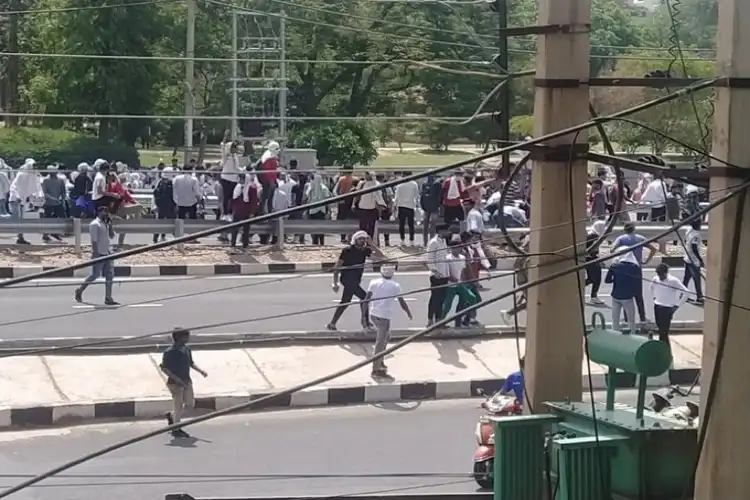
Shantanu Mukherjee
Amid the ongoing violence triggered by the announcement of Agnipath Scheme for recruitment of youth in the Armed Forces, the government has increased the upper age limit to 23 from the initial 21, in an apparent bid to give more impetus to the project. Resorting to violence, starting with the State of Bihar, and subsequently spreading to Haryana, UP and other parts of the Hindi belt belies the rationale of the scheme, primarily meant to generate employment and cut down expenses on pensions.
Earlier, the Union Cabinet had approved the recruitment scheme for the Indian youth to serve in the Armed Forces. The scheme called Agnipath and the youth selected under this scheme would be known as Agniveers. Agnipath allows the youth to serve in the Armed Forces for four years.
This scheme has been designed to enable a youthful profile of the Armed Forces. It is expected to essentially provide an opportunity to the youth who are keen to attire the uniform by attracting young talent from the society who are more in sync with the latest technological trends. As for the Armed Forces, It is expected to enhance the youthful profile of the Armed Forces and provide a fresh lease of blood and at the same time bring about a transformational shift towards a more tech-savvy Armed Forces. The dividends of short military service to the nation, society, and the youth of the nation are immense. This includes the inculcation of patriotism, teamwork, enhancement of physical fitness, ingrained loyalty to the country, and availability of trained personnel to boost national security in times of external and internal threats.
The policy comes into immediate effect. It's thought to be a major defence policy reform initiated by the Government to usher in a new era in the Human Resource policy of the three arms of the three Services.
Agniveers will be given an attractive customized monthly package along with Risk and Hardship allowances as applicable in the three services. On completion of the engagement period of four years, Agniveers will be paid one time ‘Seva Nidhi’ package which shall comprise their contribution including accrued interest thereon and matching contribution from the Government equal to the accumulated amount of their contribution including interest and the arithmetic of the same has already been worked out. The ‘Seva Nidhi’ will be exempt from Income Tax. Agniveers will also be provided non-contributory Life Insurance Cover of Rs 48 lakhs for the duration of their engagement period.
Further, during this period of service, the Agniveers will be imparted various military-linked professional skills. Post this stint of four years, the Agniveers will be infused into the civil society where they can contribute adequately to the nation-building process.
The individuals, selected for enrolment in the Armed Forces as regular cadre would be required to serve for a further period of minimum 15 years and would be governed by the existing terms and conditions of service of Junior Commissioned Officers/Other Ranks in the Indian Army and their equivalent in the Indian Navy and Indian Air Force and that of Non-Combatants enrolled in the Indian Air Force, as amended from time to time.
Significantly, on a positive note, the scheme is expected to lead to a much more youthful and technically adept warfighting force by ensuring the fine balance between youthful and experienced personnel in the Armed Forces. Advantages include inter alia a transformative reform of the recruitment policy of the Armed Forces. This is a unique opportunity for the youth to serve the country and contribute to nation-building.
Among the terms and conditions, the enrolment will be undertaken through an online centralized system for all three services with specialized rallies and campus interviews from recognized technical institutes such as Industrial Training Institutes and National Skills Qualifications Framework etc. All segments of the government are on board to launch this scheme.
Meanwhile, the Union Home Minister, Amit Shah described the Agnipath plan as a visionary and welcome decision of the Prime Minister for the bright future of the youth. In this regard, on June 16, the Ministry of Home Affairs (MHA) decided to give priority to Agniveers who complete 4 years under this scheme for recruitment in Central Armed Police Forces (CAPFs) and Assam Rifles. This brightens the prospects of these inductees as their absorption chances would deem better for those who are released after serving for a short period.
While the government in all its earnestness has introduced this scheme factoring all possible consequences, a section of the veterans of the armed forces have raised questions about the feasibility of the scheme. Some apprehend that it might compromise the combative efficacy of the Indian military rendering it not so effective to face the Chinese or Pakistani armed onslaught. Some have also raised fears that those after the military training might be allured by the unscrupulous elements to abuse them for undesirable activities.
Experts, however, feel that all such apprehensions have been adequately confabulated by the concerned much before its launch. Any attempt by the vested quarters to derail this plan may sabotage the very idea of generating employment or addressing the country’s economic concerns. More worryingly, our hostile neighbors will embark upon highlighting this project with all negativity giving malicious propaganda. This is certainly not desirable at this juncture and we should not give this luxury to our ill-wishers, particularly in these challenging times.
(Writer is a retired IPS officer, a security analyst, and a former National Security Advisor to the Prime Minister of Mauritius. Views are personal)
